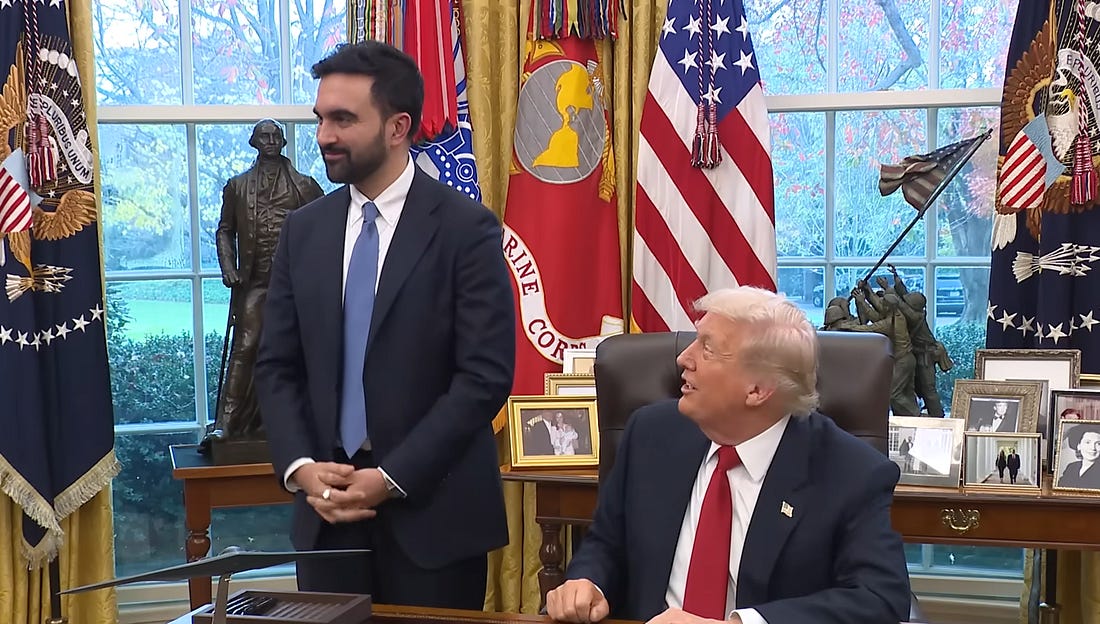We can draw important lessons from looking back on 2025 and reviewing the assault of our democracy and the debasement of American society as we knew it—as well as the victories for democracy, decency, and inclusion. There is plenty to digest as we steel ourselves for another year.
First, most politicians do not lead. They follow. We began Donald Trump’s second term with a chorus of credulous Democrats insisting they could find “common ground” with Donald Trump and Republicans. Senate Democrats caved in March on the continuing resolution. A rump group did it again in November. Too often, Democratic leaders still cannot help themselves in excusing Trump. They too frequently shy away from issues they imagine that they cannot win. What moves them to do their job, as we saw repeatedly, was fulsome, angry, and mass public opposition.
Second, Republicans care not one bit about their own constituents. Pointing out that slashing Medicaid and SNAP, zapping Affordable Care Act subsidies, messing with vaccine guidelines, and enacting cost-raising tariffs disproportionately hurt red states, especially rural residents, falls on deaf MAGA ears. They, apparently, do not care. They wish away reality to double down on radical policies, conspiracies, and downright lies to avoid Trump’s wrath and the prospect of a primary challenge. They hide from scrutiny inside the right-wing propaganda bubble. Democrats can appeal to voters on these issues; but this gang of Republicans appear prepared to lose before crossing Trump or adjusting their policies to help their own people.
Third, the Supreme Court is beyond public shaming. No matter how transparent the “Calvinball” jurisprudence, how egregious the misuse of the shadow docket, and how outraged the lower courts may be, the six justices on the MAGA majority simply keep doubling down on partisan hackery. They seem entirely indifferent to criticism from scholars and the general public. Their rulings and oral arguments shrug off consistent, serious legal analysis in favor of ideological diktats. They remain defiant, cushioned by the security of lifetime jobs, utterly cut off from the real lives of Americans. We can address their partisan hackery and assault on our constitutional system through comprehensive reform—including a mandatory ethics regimen, term limits, jurisdictional limits (they can keep original jurisdiction plus, say, maritime cases), and court expansion.
Fourth, winning requires moving public opinion to further the cause of democracy. The right-wing has understood that many battles are generational (e.g. control of the courts), and that losing battles or blips in criticism in the short-term (e.g. nixing immigration reform under President Biden) nevertheless can increase their chances of gaining power and/or undermining the other party. Democrats must take the same stance (i.e. the fight is the point), whether it is a fight to preserve ACA subsidies, filing suits to challenge lawlessness, breaking quorum in Texas and fighting the re-redistricting fight, or opposing deployment of ICE, CPB, and the national guard. Such efforts may not change the outcomes immediately, but they collectively fuel the campaign against autocracy. Americans gravitate to those who fight on their behalf.
Fifth, “electability” is a pundit-created myth. Neither elite pundits, donors, nor political operatives really know who is electable. On paper, few in those categories thought Donald Trump, Zohran Mamdani, or Rep. Alexandria Ocasio-Cortez (D-N.Y.) were “electable.” The candidates proved otherwise. By the same token, “safe” candidates, especially lifelong professional politicians, lose when they prove unable to galvanize voters (e.g., Terry McAuliffe in 2021 Virginia governor’s race, Sen. Bob Casey, Jr. in 2024). A disciplined, articulate politician who can authentically connect with people on issues they care about deeply will get elected. The voters decide electability.
Sixth, religious appeals do not work with White Christian nationalists. As we have discussed many times, White Christian nationalists generally do not seem interested in good works, helping the most vulnerable, or personal character. This is a movement seeking power, not redemption. Its adherents are motivated to remake America into a white, Christian dominated nation. Lacking the votes to bring their goals about through democracy, they are all too willing to suppress voting and rely on other anti-democratic measures. Blowing up people on the high seas, separating children from parents, brutalizing Hispanics, and taking away SNAP benefits are features, not bugs for people lacking empathy who seek racial and religious dominance.
Seventh, moderate Republicans are nonexistent. The myth of moderate Republicans willing to make deals on a bipartisan basis dies hard. But when the Senate Republicans near-unanimously rubber stamps the most extreme, unqualified nominees; Republicans in both houses pass the big, ugly big slashing Medicaid and SNAP to partially pay for tax cuts for the rich; do not demand that RFK, Jr. or Pete Hegseth resign; and instead overwhelmingly condone an abusive, chaotic immigrant scheme, it is time to stop applying the label “moderates” to the likes of Sen. Susan Collins (R-Maine), Sen. Lisa Murkowski (R-Alaska), Rep. Mike Lawler (R-N.Y.), Rep. Rob Bresnahan (R-Pa.), and others who enable their MAGA colleagues’ agenda.
Eighth, no lie is too ridiculous for MAGA cultists to reject. Nothing Trump says (e.g., denying the affordability crisis, claiming he inherited the worst inflation in history, blaming windmills for killing whales) is so absurd as to trigger guffaws—let alone objections—from MAGA Republicans in the base, Congress, or the right-wing media. Like any cult, MAGA is a closed circuit without room to question the leader’s infallibility. The right-wing media bubble certainly helps to insulate MAGA voters from reality, but it is human nature to stick with a fraudster or con man rather than admit you’ve been duped. Educating those Americans outside of the cult is possible; reaching those inside is a waste of time.
Ninth, Americans may have voted for Trump, but they overwhelmingly reject what he is doing. As obvious as it may have been to many of us that Trump was unhinged and intent on doing exactly what he said (deporting millions of people, enacting an international trade war, selling out our allies, aspiring to become a dictator), with each passing week more Americans are rejecting him and his agenda. That development should inspire confidence that Americans are not irretrievably hooked on a racist, pro-totalitarian, and pro-oligarchy agenda. We can still achieve a pro-democracy electoral majority.
Tenth, the public is the key to saving democracy. The courts matter. Opposition politicians matter. Reality (e.g., rising prices) matter. But ultimately, we have learned that only when millions of Americans get engaged, turn out to protest and vote, and take ownership of our democracy can we collectively defeat autocracy. Speaker emerita Nancy Pelosi’s favorite Lincoln quote—“Public sentiment is everything. With public sentiment, nothing can fail; without it, nothing can succeed”—has never been more apt.
What does this all add up to? Pro-democracy forces will not shame or argue MAGA Republicans into capitulation or retreat. With a helping hand from diligent lower courts, an organized electorate can end the authoritarian nightmare. Everything rests on the midterms. New leaders will emerge along the way, but only ordinary Americans who dedicate themselves to exposing the evils, unpopularity and failures of the MAGA movement can achieve a decisive victory next November.











































